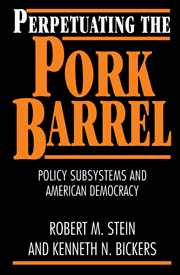2 - The programmatic expansion of U.S. domestic spending
Published online by Cambridge University Press: 05 June 2012
Summary
A common myth is that federal programs, once created, exist forever, growing unabated over time. This characterization may be more or less true for redistributive programs, but is not at all true for distributive programs. Yet distributive programs play a role in the political process independent of their size in dollars. Indeed, our argument is that there is little correlation between spending on distributive programs and their value measured in political terms. As we argue in later chapters, distributive programs are a key source of political capital for actors in policy subsystems that have a stake in the programs.
Too much of the research on the federal government has been preoccupied with expenditures. Yet not all dollars are equal. A dollar for a new bridge or dam buys something quite different than a dollar of educational assistance. A dollar of regulatory activity implies something much different than a dollar of redistribution. The point is that government does not merely spend dollars. It uses dollars to do things, to make things, and to engage in a host of disparate activities. Not all activities are well measured by counting the dollars spent.
For redistributive policies, dollars are everything. How much money and how it is allocated determine whether redistribution occurs. The zerosum quality of redistributive policies drives analysts to focus on expenditure measures. In regulatory policies there probably is some sort of correlation between program expenditures and regulatory enforcement, though the strength of this relationship doubtless is more attenuated than for redistributive policies.
- Type
- Chapter
- Information
- Perpetuating the Pork BarrelPolicy Subsystems and American Democracy, pp. 15 - 29Publisher: Cambridge University PressPrint publication year: 1995



